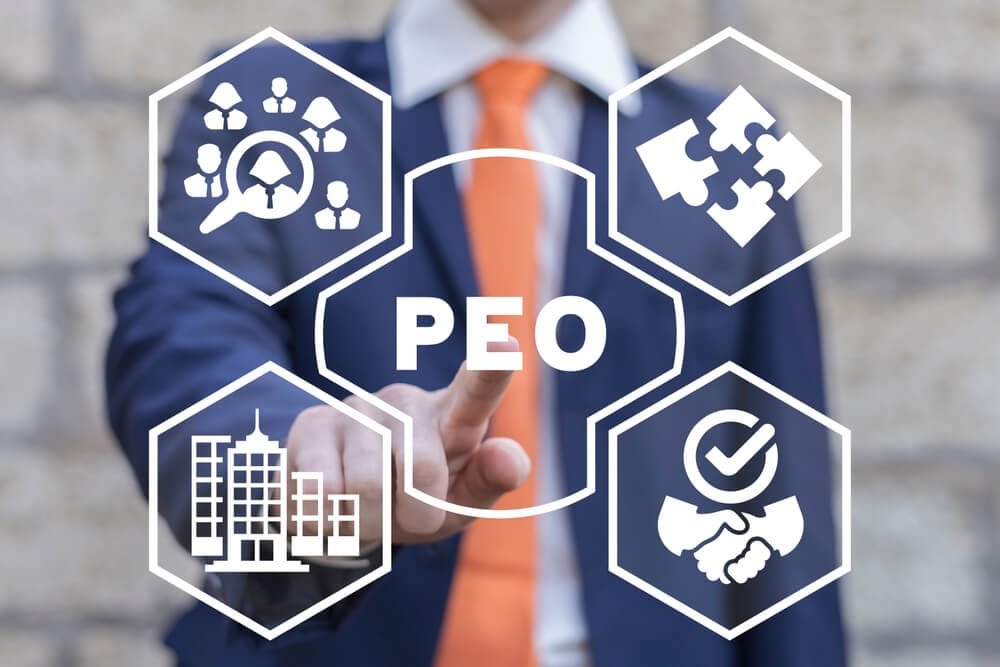A PEO or professional employer organization is an all-inclusive outsourcing option also known as co-payment. In this arrangement, the PEO performs your various time-consuming HR, and administrative functions, such as compensation and payroll administration, worker’s compensation, employment taxes, employee benefits, etc on the behalf of a business. This allows the PEO to share and manage many employee-related responsibilities and liabilities
Most of the PEOs have strategic services, but no two are exactly similar, so it’s important to research providers and compare their capabilities. When you join a PEO, it becomes the professional employer of the clients currently existing workforce, providing services and benefits.
Benefits of PEO

With expert, strategic guidance on how to use PEO, you may be able to grow your business and have peace of mind that you’re more protected while doing so. PEOs typically help with:
Processes payroll
PEOs process payroll and in some cases also pay local, state, and federal employment taxes on your behalf. They also integrate payroll with time and attendance. This helps reduce duplicate data entry and errors. If you don’t work with a certified PEO, you could be responsible for any unpaid taxes, late penalties, or interest Following are the tasks that PEO should accomplish
- Paying your employees
- Payroll management reports
- Payroll record keeping and compliance
- Garnishment and deduction administration
- PTO accruals
Administrative benefits
A co-employment arrangement usually provides access to high-quality, cost-effective health insurance, dental care, several retirement benefits, and other employee perks. The PEO usually handle the employee enrollment for these benefits and process claims for you.
Help reduce your employer’s liability
By partnering with a PEO, you may be able to lessen some of the liabilities associated with being an employer. Most PEO’s provide unparalleled support through unforeseen circumstances. They might also offer a legal defense benefit.
Access to a wide range of benefits and employee experience
A PEO can usually give you access to a wider range of benefits options, that too at better rates, than what you could have accessed on your own as a small or medium-sized organization.
your employees gain access to big-business benefits when you join a PEO. This can help you recruit and retain better talent for your organization. Your employees may have access to the following benefits:
- Medical, dental, and vision coverage
- A retirement plan
- A healthcare flexible spending account
- Personal accident insurance
- Life insurance
- Adoption assistance
- Short-term and long-term disability insurance
- Educational assistance
- Commuter benefits
Training and development
Many PEOs can offer you training and leadership development programs or services for your employees. PEO’s training services may include, an online learning management system containing interactive courses and digital books, live or virtual training seminars
HR Compliance
PEOs compliance experts can help you protect your business from fines and penalties. Their area of expertise may include, unemployment insurance, payroll tax law and reporting requirements,
Workers compensation
PEO provides you with workers’ compensation insurance coverage. The PEO also manages injured employee claims in the event of an on-site injury.
Risk and safety
PEOs employ specialists that are responsible for monitoring many employer-related state and federal laws. Equipped with this knowledge, the specialist stays abreast of constantly shifting laws, regulations, and reporting requirements that impact the services the PEO provides to your business.
Through a co-employment relationship with a PEO, your organization can effectively lessen a substantial portion of the risk associated with having employees, like:
- Correctly reporting, collecting, and depositing taxes with state and federal authorities
- EEO reporting and claim resolution
- I-9 requirements
- Management of certain employee-related claims and provision of Employee Practice Liability Insurance (EPLI)
HR Administrative tasks
A PEO helps you manage your liabilities as an employer and support your internal HR team by providing the following:
- Employee handbooks
- Termination assistance
- New hire onboarding
- Leave of absence request management
- Drug testing services
- Employee relations support
- Employment verification
- Liability management training
Human resource support
In many cases, a PEO has HR professionals who are able to provide HR services and support. If you are already having an in-house HR person or team, the PEO might partners strategically and administratively. with them
Talent management
Some PEOs offer talent services, like recruiting and strategic hiring, performance management, and employee training and engagement
Reduce costs
PEOs doesn’t only help their clients save time as well as they also help you save money through:
- Better hiring practices that increase retention and reduce turnover
- Making strategic plans for the future
- Finding new ways to motivate your employees
Recruiting support
A PEO can help you design the ideal workforce recruitment process that fits your business. It may also work with you to:
- Develop job descriptions
- Conduct wage and salary surveys
- Improve your hiring managers’ interview and candidate selection skills
Performance management support
A PEO can help you conduct employee performance evaluations and appraisals on a regular basis. In addition, to support performance improvement, PEOs often provide you with:
- Compensation resources and tools
- Assistance with job descriptions
- Supervisor coaching
- Base pay structures
- Reward and recognition program design
- Company climate surveys
- Self-help tools and worksheets for variable and sales compensation structures
Strategic HR planning
A PEO aids you in developing HR strategies that allow you to make HR management decisions. Such management decisions can support the future direction and growth of your organization.
Related: Recruitment Process Outsourcing
How to choose the right Professional Employer Organization?

To choose the right PEO for your business, investigate the co-employment market and look for PEOs that:
- Have a strong track record and revenue stability
- Supply references from other clients in your particular industry
- Can meet the needs and requirements of your business and employees
- Offer services and coverage in your business area
- Provide comprehensive support and compliance expertise
What kinds of businesses benefit from PEOs?
Small to midsized business setups tend to be in co-employment arrangements the most, but larger organizations can also benefit from PEOs In fact, PEOs are a good fit for almost all industries, including
- Computer services and IT technology
- Real estate and property management
- Engineering services
- Legal services
- Health services
- Management consulting services
- Accounting and auditing
- Business services
- Insurance companies
- Wholesale industries
- Manufacturing industries
- Plumbing, HVAC, electrical and other trades
- Nonprofit organizations
What does PEO doesn’t do?
Although a PEO may handle HR administrative tasks for an organization, there are many tasks and decisions that PEO can’t do. A PEO will not:
- Make decisions regarding your business independently
- Dictate pay rates, hours, or schedules

